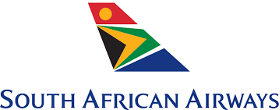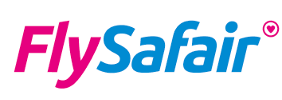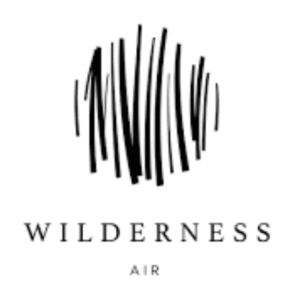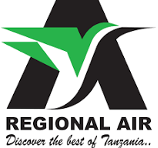IMPORTANT TRAVEL INFO

TRAVELING WITH MINORS
VERY IMPORTANT!
Requirements for travelling with underage children / minors:
All minor children travelling through any South African port of entry must have comply with the requirements below, depending on their spesific situationn:
- CHILD ACCOMPANIED BY BOTH PARENTS
- CHILD ACCOMPANIED BY ONE PARENT
Please read more
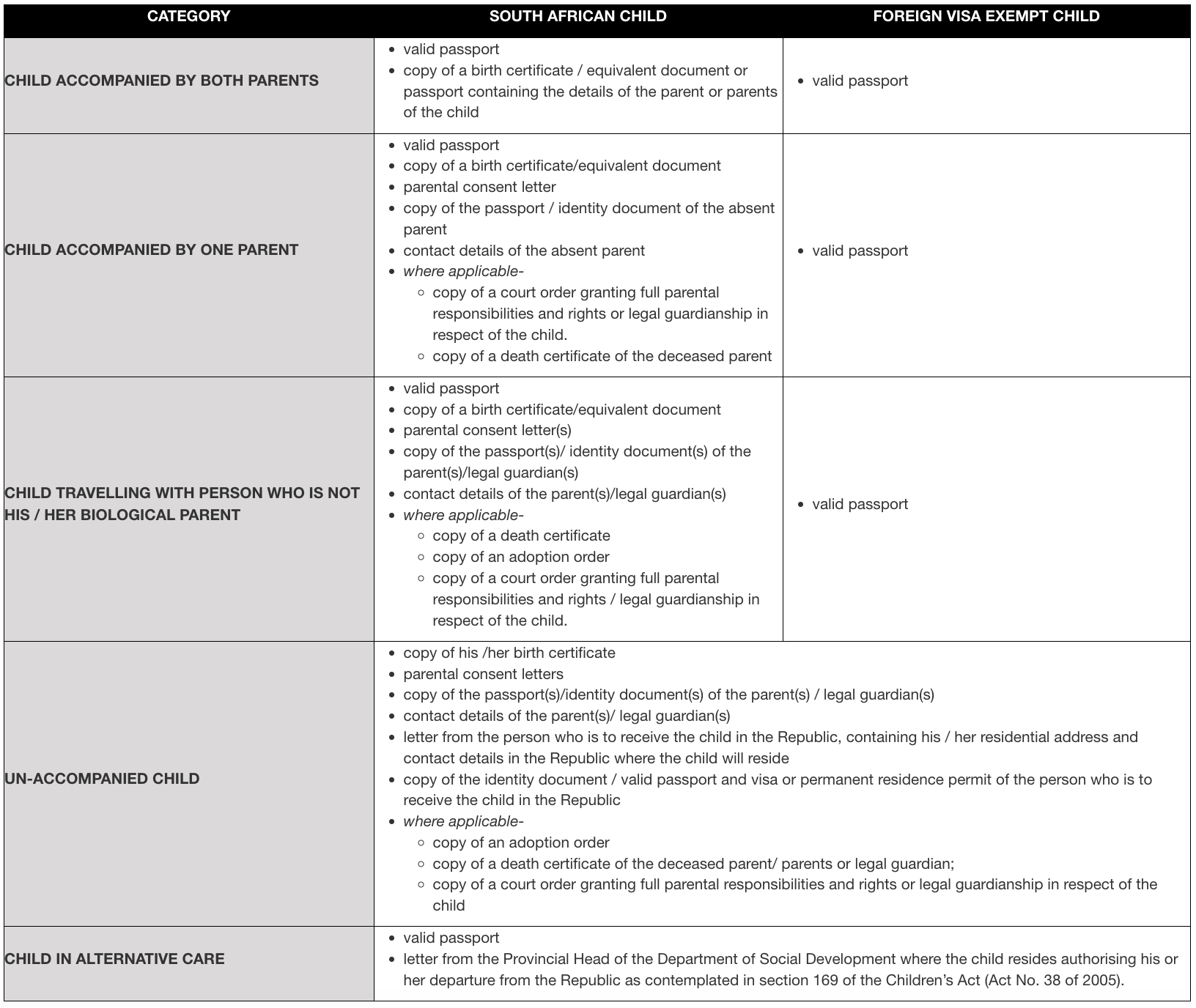

PASSPORTS
Due to constantly changing requirements, it is recommended that travelers contact the appropriate embassy for accurate and up-to-date information & requirements
Please refer to https://travel.state.gov/content/travel.html for updated information on each country.
Passport & Visa requirements are guest’s sole responsibility*
- Expiration date valid at least 6 months past return dates
- Please check the number of blank Visa pages required by each country.Passport MUST have AT LEAST 2-3 blank “VISAS pages” per entry – the word “VISAS” must appear at the top of the page to be considered a “Visas Page” . They must be consecutive and blank back and front. Please note the 6 pages required for NAMIBIA!
- Airlines will refuse board if you do not meet this requirement. Please click to view more info on this link
- Please note special requirements when travelling with a minor(s)

BLANK VISA PAGE REQUIREMENTS
The table below shows the number of blank visa pages required by each country.
- If you plan to visit multiple countries during the same trip, you need to add the requirements for each country together.
- If your passport does not have a sufficient number of blank pages, you will need to replace it before your trip.
- It is no longer possible to add visa pages to a passport. You must apply for a new passport.
- South Africa 2 (2 Consecutive blank Visa Pages: South Africa requires travelers to have 2 consecutive completely blank visa pages in their passports upon every arrival in South Africa. YOU WILL BE DENIED ENTRY if you do not have 2 consecutive blank visa pages in your passport. This does not include the endorsement pages.
- Botswana 3
- Kenya 2
- Namibia 3
- Rwanda 1
- Tanzania 2
- Uganda 1
- Zambia 3
- Zimbabwe 3

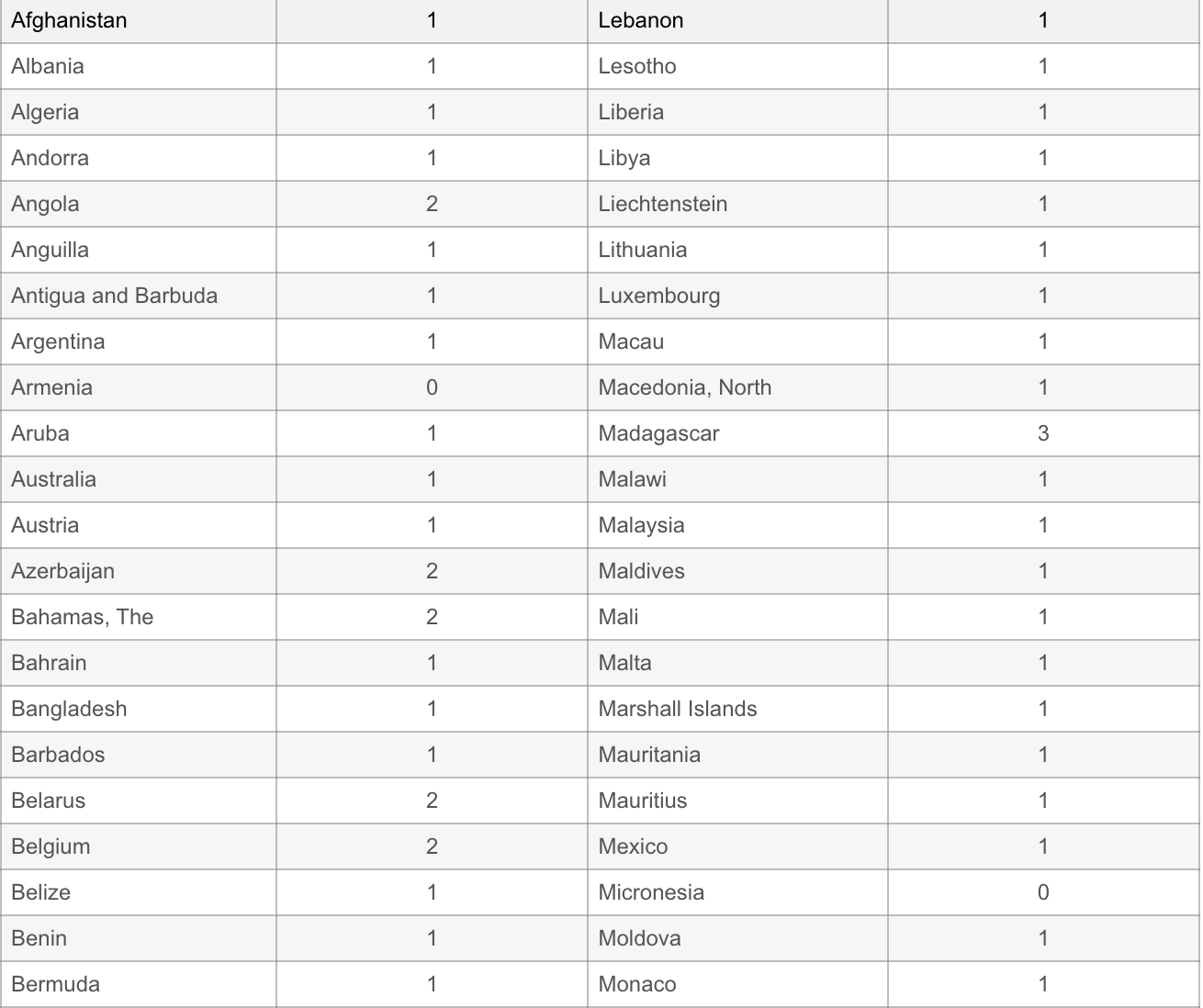
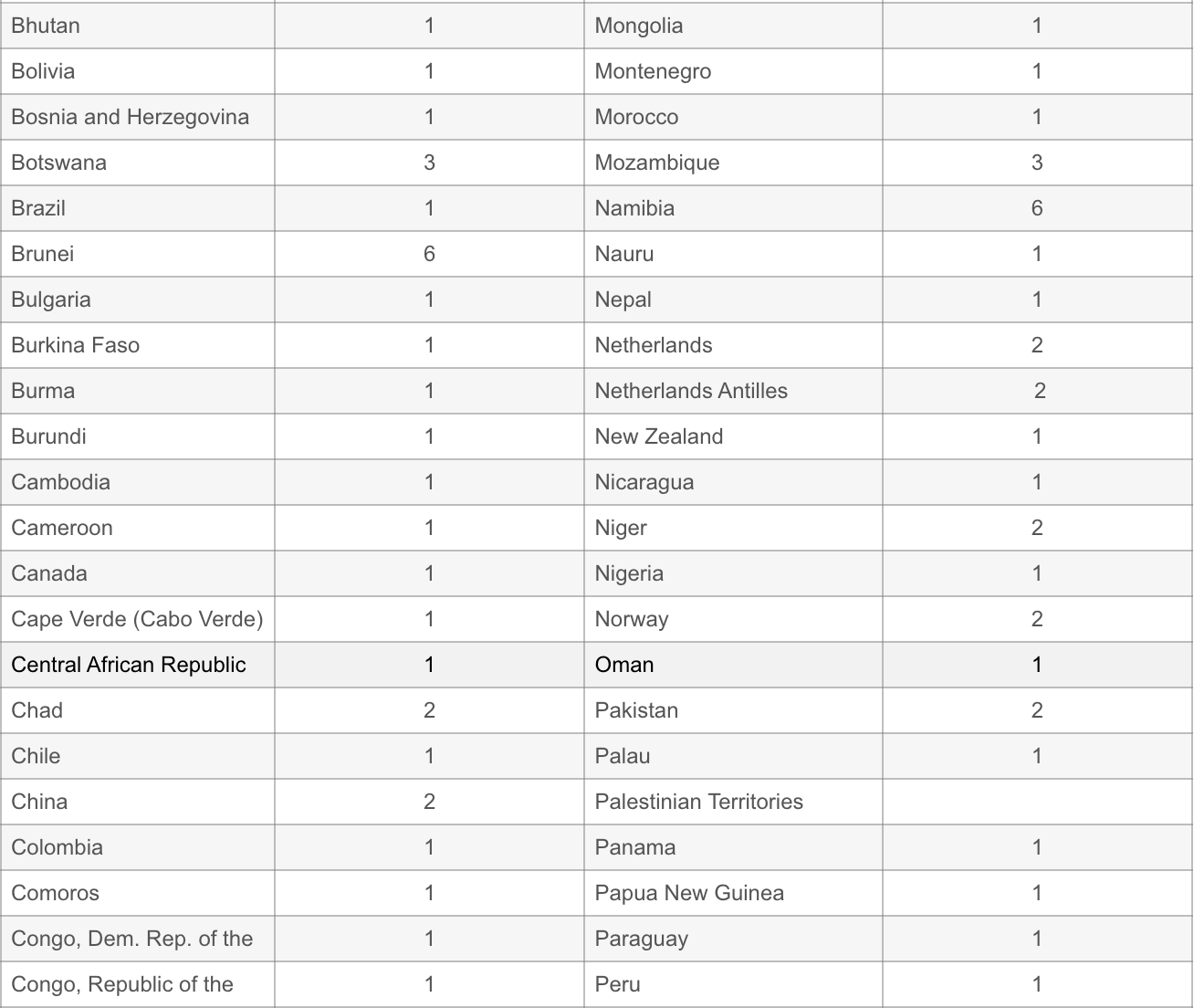
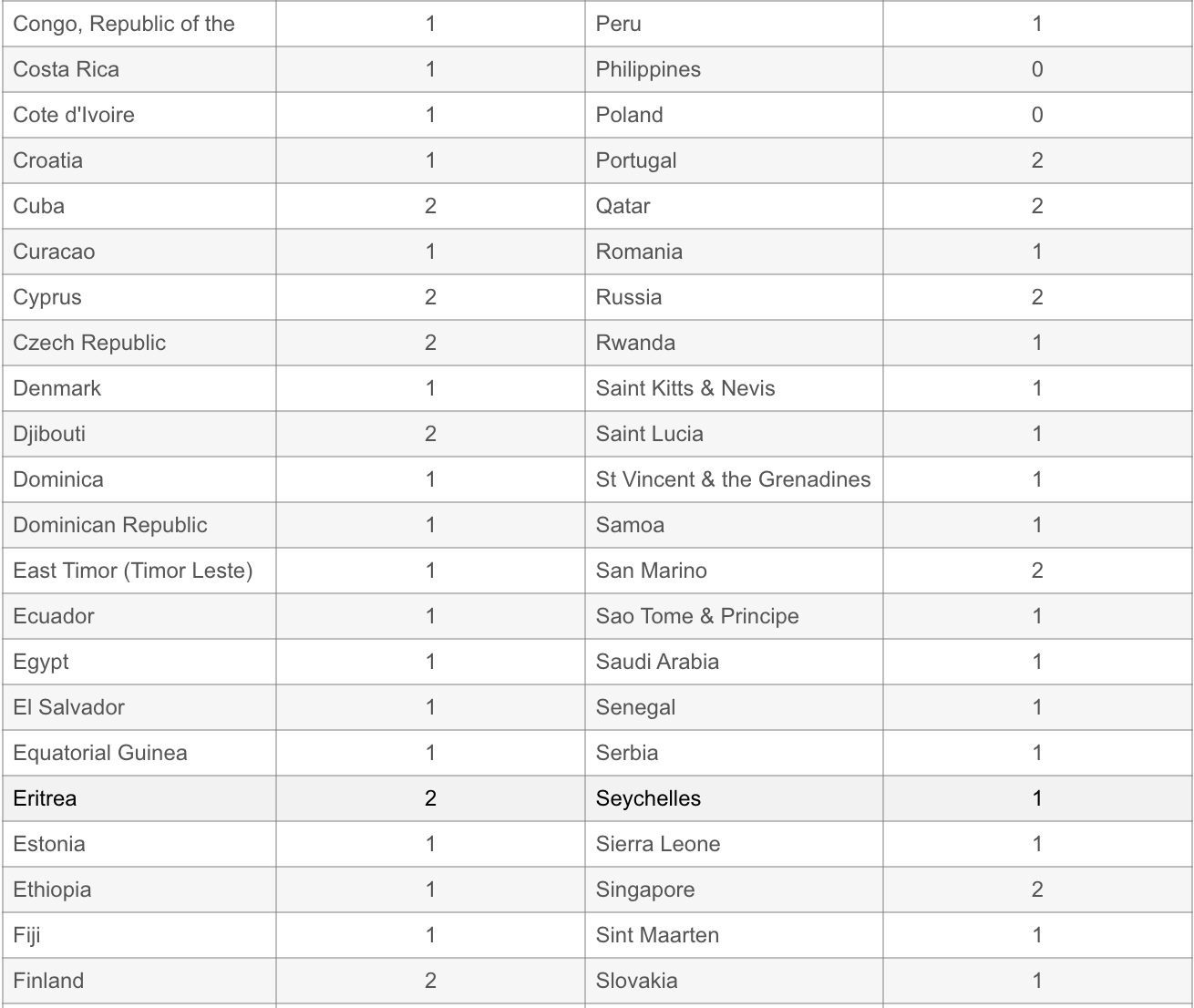
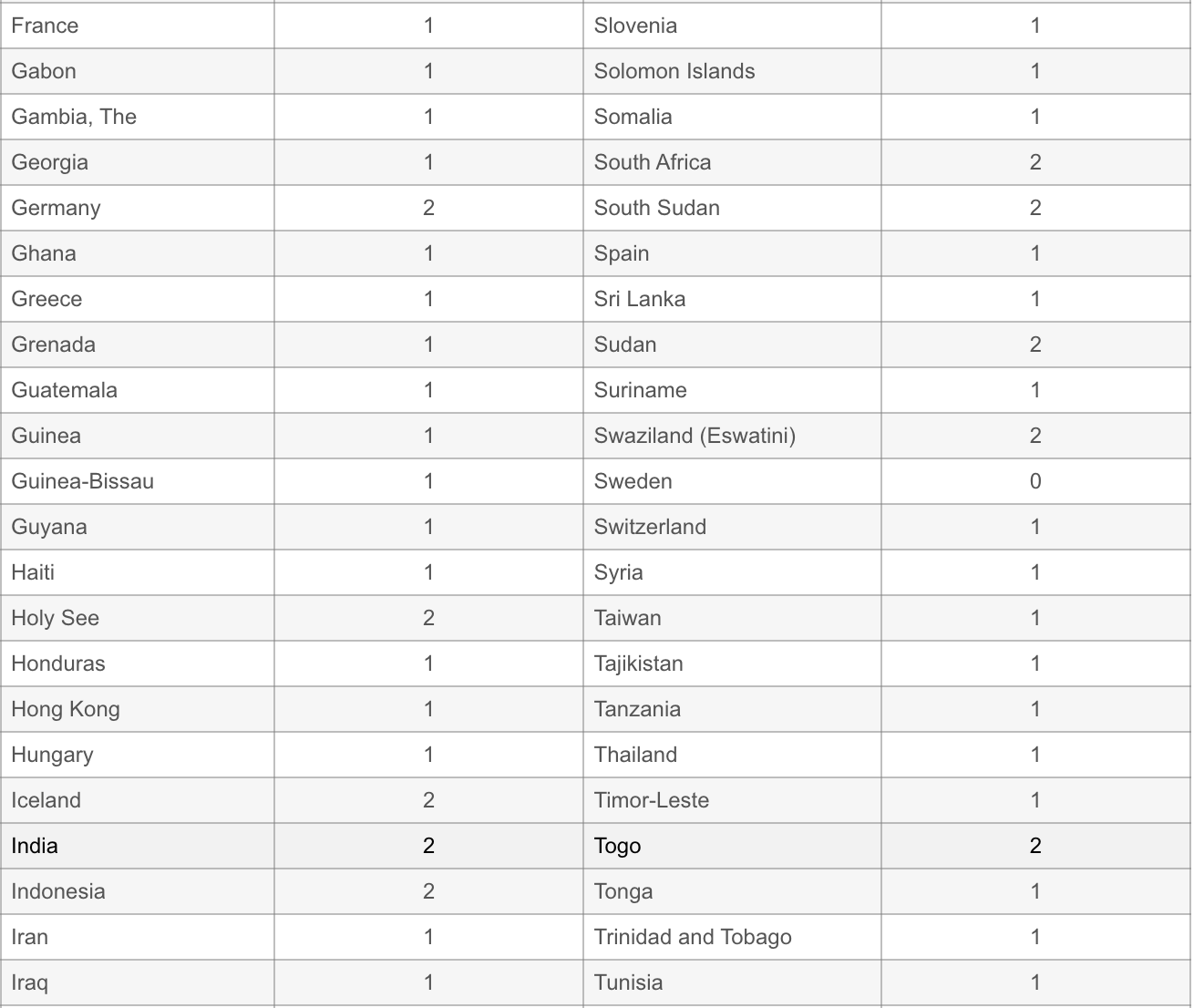
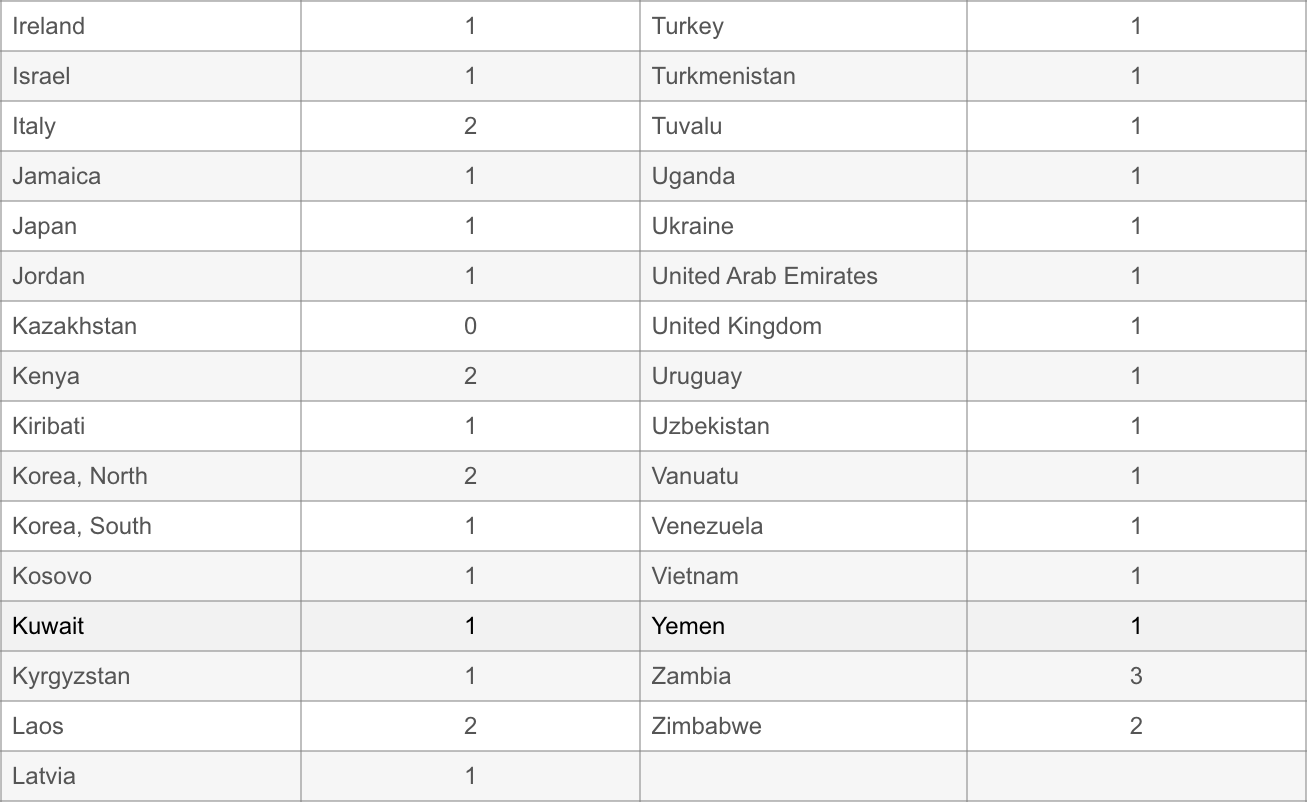 Sample calculation of how many blank visa pages your need:
Sample calculation of how many blank visa pages your need:
Here is the ling explanation or my reasoning:
If you start with 11 or 12 Blank Visa Pages:
- Enter South Africa: Let’s say they stamp 1 page
- Enter Zimbabwe: Let’s say they stamp 1 page, usually they would stamp on the same page as South Africa, but in this case lets say they use their own page – some countries have a big stamp that takes up a whole page, so that is why I am accounting for a page per entry
- Enter Botswana: let’s say they stamp 1 page (to the House Boat)
- Enter Namibia: Let’s say they stamp 1 page (via Impalila island Immigration office to go to the HouseBoat)
- Re-Enter Namibia: Let’s say they stamp 1 page (via Impalila island Immigration office to go back to Kasane Airport in Botswana)
- Re-Enter Botswana: let’s say they stamp 1 page (to fly out of Kasane airport to Johannesburg)
- Re-Enter South Africa: Let’s say they stamp 1 page (to fly out of Johannesburg back to the USA)
So: 11 pages minus: #1 minus #2 minus #3 will leave you with at least 8 pages as required by Namibia. Then minus # 4, will leave you with at least 7 pages as required by Namibia, Minus # 5, Minus # 6, Minus # 7 will leave you with at least 4 empty pages which is more that South Africa requires
How Many Blank Pages Are Required by Each Country?
- Many countries have a specific travel regulation for the number of blank passport pages visitors should have. This is to allow space for visas and visa stamps.
- Before embarking on an international trip, it is important to check your destination’s passport requirements to ensure that you meet them.
- Having a certain number of blank passport pages is a mandatory rule for some territories, along with any necessary travel documents such as an eVisa or Travel Health Certificate.
- Each border authority has its own passport requirements for travelers. The number of compulsory blank pages depends on the individual territory.
- Countries such as the United Kingdom, Canada, and Morocco only require visitors to have 1 blank page to enter.
- Others, for example Germany, India, and South Africa, follow a 2-page regulation.
- Some African destinations need at least 3 blank pages, such as Botswana, Mozambique, and Zambia.
- There are even some territories, including Brunei and Namibia, that demand a minimum of 6 empty passport pages.
- If you fail to meet these requirements, you could be refused permission to board by an airline or refused entry at border control.
What if I am visiting multiple countries?
- If a trip consists of visiting multiple countries, it is necessary to add the requirements of each country together.
- For example, if you are traveling to somewhere that requires 1 page, then continuing to somewhere that requires 2, you will need to have a total of 3 empty passport pages.
Can I Add Passport Pages?
- Most countries do not allow passport holders to add pages. The United States, for example, previously provided this service but no longer do. The same applies for the UK.
- In most cases, it is necessary to apply for a new passport if there are no more blank pages left.
- You can contact your destination’s embassy or consulate if you are unsure about passport page requirements.
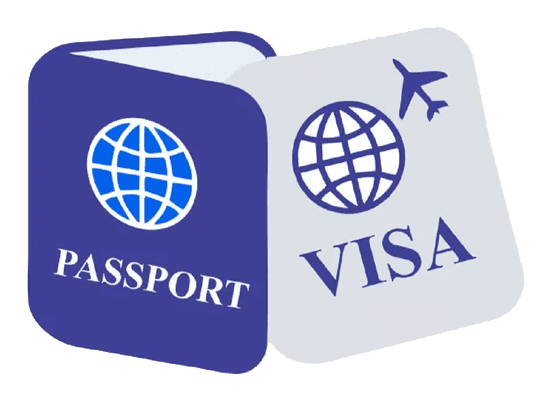
VISAS
VISA Application/Approvals & PASSPORT Validity, incl. the required amoutn of empty Visa Pages in the passport are guest’s sole responsibility.
Africa Photo Safaris can assist you with Visa applications (addl. fee applies)
- Please refer to https://www.passportindex.org/ for updated information on each country.
- US citizens need to obtain a visa at the port of entry:
- Namibia: Approx. $90 / NAD 1,700 and must be purchased online prior to travel
- Zimbabwe: Cost is US $ 30 per person (single entry) & $ 50 per person (multiple entry) and should be paid in cash/US at the port of entry
- Tanzania: $100 and must be purchased online prior to travel
- Kenya: $32 and must be purchased online prior to travel
- Uganda: $50 and must be purchased online prior to travel
U.S. citizens planning to visit Botswana for tourism purposes do not require a visa for stays of up to 90 days. Entry Requirements: Passport Validity: Your U.S. passport must be valid for at least six months beyond your intended date of entry into Botswana. Proof of Sufficient Funds: Be prepared to demonstrate that you have sufficient funds to cover your stay. Return or Onward Travel: You may need to show evidence of a return or onward travel ticket. Yellow Fever Vaccination: If you are arriving from a country with a risk of yellow fever transmission, you must present an International Certificate of Vaccination for Yellow Fever. Disclaimer: The information provided above is intended as a general guideline for obtaining a tourist visa for Namibia. It is the responsibility of travellers and/or their travel agents to verify the most up-to-date visa requirements with their local Namibian embassy or consulate before travel. The Namibian Ministry of Home Affairs, Immigration, Safety, and Security has announced that, as of 1 April 2025, nationals from 33 countries will require a visa to enter Namibia for tourism purposes. Apply online for a Namibian (VISA ON ARRIVAL) prior to arrival in Namibia, and to be presented upon arrival at designated ports of entry. 👉 Namibia Visa on Arrival Application Info & Instructions A visa is required for USA citizens entering Namibia: Note: Visa Requirements: Application Process: U.S. citizens can apply for a visa upon arrival at Namibia's international airports, such as Hosea Kutako International Airport in Windhoek and Walvis Bay International Airport, or at designated border posts. Alternatively, they can apply online through Namibia's official eVisa portal. Visa Fee: The visa fee is NAD1,600 Namibian dollars (appr. € 84 / US$ 90). Duration of Stay: The visa allows for a stay of up to 90 days within a calendar year. Additional Entry Requirements: Passport Validity: Your U.S. passport must be valid for at least six months beyond your intended date of entry into Namibia. Proof of Sufficient Funds: Be prepared to demonstrate that you have sufficient funds to cover your stay. Return or Onward Travel: You may need to show evidence of a return or onward travel ticket. Yellow Fever Vaccination: IF you are arriving from a country with a risk of yellow fever transmission, you must present an International Certificate of Vaccination for Yellow Fever. Additional requirements: Disclaimer: The information provided above is intended as a general guideline for obtaining a tourist visa for Namibia. It is the responsibility of travelers and/or their travel agents to verify the most up-to-date visa requirements with their local Namibian embassy or consulate before travel. As of January 5, 2024, U.S. citizens planning to visit Kenya for tourism purposes are required to obtain an Electronic Travel Authorization (eTA) prior to arrival. 👉 Kenya e-visa Application Info & Instructions eTA Application Process: Online Application: Submit your eTA application through Kenya's official portal at www.etakenya.go.ke. Processing Time: Applications are typically processed within one business day. Validity: The eTA is valid for a single entry and allows a stay of up to 90 days. Entry Requirements: Passport Validity: Your U.S. passport must be valid for at least six months beyond your intended date of departure from Kenya. Blank Passport Visa Pages: Ensure your passport has at least two blank pages for entry and exit stamps. Yellow Fever Vaccination: A yellow fever vaccination certificate is required if you are arriving from a country with a risk of yellow fever transmission. Additional Information: Visa Fees: The eTA fee is approximately USD $50 for a single-entry visa. Disclaimer: The information provided above is intended as a general guideline for obtaining a tourist visa for Namibia. It is the responsibility of travellers and/or their travel agents to verify the most up-to-date visa requirements with their local Namibian embassy or consulate before travel. U.S. citizens planning to visit South Africa for tourism purposes do not require a visa for stays of up to 90 days. Entry Requirements: Passport Validity: Your U.S. passport must be valid for at least 30 days beyond your intended date of departure from South Africa. Blank Passport Visa Pages: Ensure your passport has at least two consecutive blank pages for entry and exit stamps. Yellow Fever Vaccination: A yellow fever vaccination certificate is required only if you are arriving from or have transited through a country with a risk of yellow fever transmission. Additional Information: Traveling with Minors: It is MANDATORY to have parent consent letter (if both parents are not traveling with the child) as well as the child's unabridged birth certificate Purpose of Visit: This exemption applies to tourism and business visits. Overstaying: Overstaying the permitted 90 days can result in fines, deportation, and future travel restrictions. Travel Registration: While not mandatory, it's advisable to register your travel plans with the U.S. Department of State's Smart Traveler Enrollment Program (STEP) to receive important information about your destination and help the U.S. Embassy contact you in an emergency. Disclaimer: The information provided above is intended as a general guideline for obtaining a tourist visa for Namibia. It is the responsibility of travellers and/or their travel agents to verify the most up-to-date visa requirements with their local Namibian embassy or consulate before travel. U.S. citizens planning to visit Tanzania for tourism purposes are required to obtain a visa. There are two primary methods to acquire a visa: applying for an eVisa online or obtaining a visa upon arrival in Tanzania. 👉 Tanzania Visa Application Info & Instructions eVisa Application: Online Application: U.S. citizens can apply for an eVisa through Tanzania's official portal at www.immigration.go.tz. The application process involves filling out an online form, making the necessary payment, and submitting required documents. Processing Time: Applications are typically processed within 1-2 business days. Validity and Fee: The eVisa is valid for a single entry and allows a stay of up to 90 days. The visa fee is approximately USD $100. Visa on Arrival: Availability: U.S. citizens can obtain a visa upon arrival at Tanzanian ports of entry, such as international airports or border crossings. Requirements: Travelers should have a valid passport with at least six months of validity beyond the intended departure date from Tanzania, a recent passport-sized photograph, and the visa fee. Additional Entry Requirements: Yellow Fever Vaccination: A yellow fever vaccination certificate is required if you are arriving from a country with a risk of yellow fever transmission. Proof of Funds and Return Ticket: Travelers may need to show proof of sufficient funds for their stay and a return or onward travel ticket. Zanzibar Insurance Fee: Starting September 1, 2024, tourists visiting Zanzibar, an island off the coast of Tanzania, are required to pay a mandatory $44 insurance fee. This fee provides coverage for health protection, lost baggage, passport loss, accidents, and emergency evacuations for up to 92 days. Disclaimer: The information provided above is intended as a general guideline for obtaining a tourist visa for Namibia. It is the responsibility of travellers and/or their travel agents to verify the most up-to-date visa requirements with their local Namibian embassy or consulate before travel. U.S. citizens planning to visit Zimbabwe for tourism purposes are required to obtain a visa. Visas can be obtained upon arrival at Zimbabwe's international airports or other border ports-of-entry. Alternatively, travelers can apply online through Zimbabwe's official eVisa portal. Visa Fees: Single Entry (30 days): USD $30 Double Entry (45 days): USD $45 Multiple Entry (12 months): USD $160 Please note that visa fees are subject to change. Entry Requirements: Passport Validity: Your U.S. passport must be valid for at least six months beyond your intended date of departure from Zimbabwe. Blank Passport Pages: Ensure your passport has at least two consecutive blank pages for entry and exit stamps. South African officials, if transiting through South Africa, require two clean, consecutive pages for each transit. Proof of Sufficient Funds: Be prepared to demonstrate that you have adequate funds to cover your stay. Return or Onward Travel: You may need to show evidence of a return or onward travel ticket. Yellow Fever Vaccination: If you are arriving from a country with a risk of yellow fever transmission, you must present an International Certificate of Vaccination for Yellow Fever. Application Process: Online Application: Apply through Zimbabwe's official eVisa portal. Visa on Arrival: Available at international airports and other border ports-of-entry. Disclaimer: The information provided above is intended as a general guideline for obtaining a tourist visa for Namibia. It is the responsibility of travellers and/or their travel agents to verify the most up-to-date visa requirements with their local Namibian embassy or consulate before travel. U.S. citizens planning to visit Zambia for tourism purposes are not required to obtain a visa. Botswana
Namibia
Kenya
South Africa
Tanzania
Uganda
Zimbabwe
Zambia

HEALTH
Click for QUICK SEARCH requirements & restrictions for EACH COUNTRY
Botswana
VACCINATIONS RECOMMENDED:Typhoid & Colera
MALARIA PROPHOLAXIS
CDC recommends that travelers going to Zimbabwe take prescription medicine to prevent malaria. Depending on the medicine you take, you will need to start taking this medicine multiple days before your trip, as well as during and after your trip. Talk to your doctor about which malaria medication you should take.
COVID-19: Botswana currently has no COVID-19 vaccination or testing requirements for entry for U.S. and Canadian residents.
Namibia
VACCINATIONS RECOMMENDED:Typhoid & Colera
COVID-19: Namibia currently has no COVID-19 vaccination or testing requirements for entry for U.S. and Canadian residents.
Kenya
VACCINATIONS
- Required: Yellow Fever (must be administered a minimum of 10 days prior to entry
- Recommended: Typhoid & Colera
MALARIA PROPHOLAXIS
CDC recommends that travelers going to Zimbabwe take prescription medicine to prevent malaria. Depending on the medicine you take, you will need to start taking this medicine multiple days before your trip, as well as during and after your trip. Talk to your doctor about which malaria medication you should take.
COVID - 19
- Tanzania currently has no COVID-19 vaccination or testing requirements for entry for U.S. and Canadian residents.
- Visit the U.S. Department of State at travel.state.gov or the Government of Canada at travel.gc.ca/travelling/advisories for up-to-date information and travel advisories.
- All requirements are subject to change
YELLOW FEVER
CDC recommendation: Yellow fever vaccination is recommended for all travelers ≥9 months old.
Although a yellow fever vaccination is only required to enter Kenya if you are arriving from, or have transited through, a yellow fever-endemic area in South America or Africa–including East African countries such as Tanzania and Uganda.
The CDC and WHO each provide a current list of all affected countries. If vaccination for yellow fever is necessary, you must carry an International Certificate of Vaccination provided by your physician; you may be denied entry without it. If your physician advises against receiving the vaccination because of your personal medical history, he or she can provide you with the necessary documentation for the country/countries you are visiting. You will be traveling to an area of malaria transmission.
Entry Requirements
Entry requirements for proof of YF vaccination under the International Health Regulations (IHR) differ from CDC’s YF vaccination recommendations. Under the IHR, countries are permitted to establish YF vaccine entry requirements to prevent the importation and transmission of YF virus within their boundaries. Certain countries require proof of vaccination from travelers arriving from all countries (Table 5-25); some countries require proof of vaccination only for travelers above a certain age coming from countries with risk for YF virus transmission. The World Health Organization (WHO) defines areas with risk for YF virus transmission as countries or areas where YF virus activity has been reported currently or in the past, and where vectors and animal reservoirs exist.
Unless issued a medical waiver by a yellow fever vaccine provider, travelers must comply with entry requirements for proof of vaccination against YF.
WHO publishes a list of YF vaccine country entry requirements and recommendations for international travelers approximately annually. But because entry requirements are subject to change at any time, health care professionals and travelers should refer to the online version of this book and the CDC Travelers’ Health website for any updates before departure.
Read more about this & the YELLOW FEVER WAIVER
MALARIA
CDC recommends that travelers going to certain areas of Kenya take prescription medicine to prevent malaria. Depending on the medicine you take, you will need to start taking this medicine multiple days before your trip, as well as during and after your trip. Talk to your doctor about which malaria medication you should take.
ANTI-ITCH (Antihistamine cream or ointment)
Please be sure top pack a tube or 2 of “anti-itch” cream which will help alleviate mosquito and/or tsetse bite spots.
We strongly advise that you speak with your doctor or travel clinic regarding your itinerary, individual risk assessment and options for mosquito bite prevention and antimalarial drugs. We recommend filling any prescriptions before you depart.
South Africa
VACCINATIONS RECOMMENDED:Typhoid & Colera
COVID-19: South Africa currently has no COVID-19 vaccination or testing requirements for entry for U.S. and Canadian residents.
Tanzania
VACCINATIONS
- Required: Yellow Fever (must be administered a minimum of 10 days prior to entry
- Recommended: Typhoid & Colera
MALARIA PROPHOLAXIS
CDC recommends that travelers going to Zimbabwe take prescription medicine to prevent malaria. Depending on the medicine you take, you will need to start taking this medicine multiple days before your trip, as well as during and after your trip. Talk to your doctor about which malaria medication you should take.
YELLOW FEVER
Note: Required if you are traveling through Kenya prior to your arrival in Tanzania
CDC recommendation: Travelers ≥1 year of age arriving from a country with risk of yellow fever virus transmission, including transit >12 hours in an airport located in a country with risk of yellow fever virus transmission, are required to show proof of vaccination on an International Certificate of Vaccination or Prophylaxis to enter the country
- Yellow fever vaccination is recommended for all travelers ≥9 months old.
- A yellow fever vaccination is only required to enter Tanzania if you are arriving from, or have transited through, a yellow fever-endemic area in South America or Africa – including East African countries such as Kenya and Uganda.
- This means that if your itinerary includes visits to both Kenya and Tanzania, you may be asked to show proof of yellow fever vaccination when entering either country.
- The CDC and WHO each provide a current list of all affected countries.
- If vaccination for yellow fever is necessary, you must carry an International Certificate of Vaccination provided by your physician; you may be denied entry without it.
- If your physician advises against receiving the vaccination because of your personal medical history, he or she can provide you with the necessary documentation for the country/countries you are visiting.
- You will be travelling to an area of malaria transmission.
- We strongly advise that you speak with your doctor or travel clinic regarding your itinerary, individual risk assessment and options for mosquito bite prevention and antimalarial drugs. We recommend filling any prescriptions before you depart.
Entry Requirements
Entry requirements for proof of YF vaccination under the International Health Regulations (IHR) differ from CDC’s YF vaccination recommendations. Under the IHR, countries are permitted to establish YF vaccine entry requirements to prevent the importation and transmission of YF virus within their boundaries. Certain countries require proof of vaccination from travelers arriving from all countries (Table 5-25); some countries require proof of vaccination only for travelers above a certain age coming from countries with risk for YF virus transmission. The World Health Organization (WHO) defines areas with risk for YF virus transmission as countries or areas where YF virus activity has been reported currently or in the past, and where vectors and animal reservoirs exist.
Unless issued a medical waiver by a yellow fever vaccine provider, travelers must comply with entry requirements for proof of vaccination against YF.
WHO publishes a list of YF vaccine country entry requirements and recommendations for international travelers approximately annually. But because entry requirements are subject to change at any time, health care professionals and travelers should refer to the online version of this book and the CDC Travelers’ Health website for any updates before departure.
Read more about this & the YELLOW FEVER WAIVERMALARIA
CDC recommends that travelers going to certain areas of Kenya take prescription medicine to prevent malaria. Depending on the medicine you take, you will need to start taking this medicine multiple days before your trip, as well as during and after your trip. Talk to your doctor about which malaria medication you should take.
ANTI-ITCH (Antihistamine cream or ointment)
Please be sure top pack a tube or 2 of “anti-itch” cream which will help alleviate mosquito and/or tsetse bite spots.
COVID-19
Tanzania currently has no COVID-19 vaccination or testing requirements for entry for U.S. and Canadian residents.
Uganda
VACCINATIONS
- Required: Yellow Fever (must be administered a minimum of 10 days prior to entry
- Recommended: Typhoid & Colera
COVID - 19
- Uganda currently has no COVID-19 vaccination or testing requirements for entry for U.S. and Canadian residents.
- Visit the U.S. Department of State at travel.state.gov or the Government of Canada at travel.gc.ca/travelling/advisories for up-to-date information and travel advisories.
- All requirements are subject to change
YELLOW FEVER
CDC recommendation: Yellow fever vaccination is recommended for all travelers ≥9 months old.
Although a yellow fever vaccination is only required to enter Kenya if you are arriving from, or have transited through, a yellow fever-endemic area in South America or Africa–including East African countries such as Tanzania and Uganda.
The CDC and WHO each provide a current list of all affected countries. If vaccination for yellow fever is necessary, you must carry an International Certificate of Vaccination provided by your physician; you may be denied entry without it. If your physician advises against receiving the vaccination because of your personal medical history, he or she can provide you with the necessary documentation for the country/countries you are visiting. You will be travelling to an area of malaria transmission.
Entry Requirements
Entry requirements for proof of YF vaccination under the International Health Regulations (IHR) differ from CDC’s YF vaccination recommendations. Under the IHR, countries are permitted to establish YF vaccine entry requirements to prevent the importation and transmission of YF virus within their boundaries. Certain countries require proof of vaccination from travelers arriving from all countries (Table 5-25); some countries require proof of vaccination only for travelers above a certain age coming from countries with risk for YF virus transmission. The World Health Organization (WHO) defines areas with risk for YF virus transmission as countries or areas where YF virus activity has been reported currently or in the past, and where vectors and animal reservoirs exist.
Unless issued a medical waiver by a yellow fever vaccine provider, travelers must comply with entry requirements for proof of vaccination against YF.
WHO publishes a list of YF vaccine country entry requirements and recommendations for international travelers approximately annually. But because entry requirements are subject to change at any time, health care professionals and travelers should refer to the online version of this book and the CDC Travelers’ Health website for any updates before departure.
Read more about this & the YELLOW FEVER WAIVER
MALARIA
CDC recommends that travelers going to certain areas of Kenya take prescription medicine to prevent malaria. Depending on the medicine you take, you will need to start taking this medicine multiple days before your trip, as well as during and after your trip. Talk to your doctor about which malaria medication you should take.
ANTI-ITCH (Antihistamine cream or ointment)
Please be sure top pack a tube or 2 of “anti-itch” cream which will help alleviate mosquito and/or tsetse bite spots.
We strongly advise that you speak with your doctor or travel clinic regarding your itinerary, individual risk assessment and options for mosquito bite prevention and antimalarial drugs. We recommend filling any prescriptions before you depart.
Zimbabwe
VACCINATIONS RECOMMENDED:Typhoid & Colera
MALARIA PROPHOLAXIS
CDC recommends that travelers going to Zimbabwe take prescription medicine to prevent malaria. Depending on the medicine you take, you will need to start taking this medicine multiple days before your trip, as well as during and after your trip. Talk to your doctor about which malaria medication you should take.
COVID-19: Zimbabwe currently has no COVID-19 vaccination or testing requirements for entry for U.S. and Canadian residents.
Zambia
VACCINATIONS RECOMMENDED:Typhoid & Colera
MALARIA PROPHOLAXIS
CDC recommends that travelers going to Zimbabwe take prescription medicine to prevent malaria. Depending on the medicine you take, you will need to start taking this medicine multiple days before your trip, as well as during and after your trip. Talk to your doctor about which malaria medication you should take.
COVID-19: Zambia currently has no COVID-19 vaccination or testing requirements for entry for U.S. and Canadian residents.

STAY IN TOUCH!
The table below shows the number of blank visa pages required by each country.
- If you plan to visit multiple countries during the same trip, you need to add the requirements for each country together.
- If your passport does not have a sufficient number of blank pages, you will need to replace it before your trip.
- It is no longer possible to add visa pages to a passport. You must apply for a new passport.
Botswana 3 blank pages (3 or more unused pages; one blank page per entry)
Kenya 2
Mozambique 3
Namibia 3
Rwanda 1
South Africa 2 (2 Consecutive blank Visa Pages: South Africa requires travelers to have 2 consecutive completely blank visa pages in their passports upon every arrival in South Africa. YOU WILL BE DENIED ENTRY if you do not have 2 consecutive blank visa pages in your passport. This does not include the endorsement pages.
Tanzania 2
Uganda 1
Zambia 3
Zimbabwe 3
(All visitors to Zimbabwe need to present a valid passport, return transportation ticket, sufficient funds and at least 3 blank visa pages for entry and exit stamps.
Sample calculation of how mqny blank visa pages your need:
Here is the ling explanation or my reasoning:
If you start with 11 or 12 Blank Visa Pages:
- Enter South Africa: Let’s say they stamp 1 page
- Enter Zimbabwe: Let’s say they stamp 1 page, usually they would stamp on the same page as South Africa, but in this case lets say they use their own page – some countries have a big stamp that takes up a whole page, so that is why I am accounting for a page per entry
- Enter Botswana: let’s say they stamp 1 page (to the House Boat)
- Enter Namibia: Let’s say they stamp 1 page (via Impalila island Immigration office to go to the HouseBoat)
- Re-Enter Namibia: Let’s say they stamp 1 page (via Impalila island Immigration office to go back to Kasane Airport in Botswana)
- Re-Enter Botswana: let’s say they stamp 1 page (to fly out of Kasane airport to Johannesburg)
- Re-Enter South Africa: Let’s say they stamp 1 page (to fly out of Johannesburg back to the USA)
So: 11 pages minus: #1 minus #2 minus #3 will leave you with at least 8 pages as required by Namibia. Then minus # 4, will leave you with at least 7 pages as required by Namibia, Minus # 5, Minus # 6, Minus # 7 will leave you with at least 4 empty pages which is more that South Africa requires
How Many Blank Pages Are Required by Each Country?
- Many countries have a specific travel regulation for the number of blank passport pages visitors should have. This is to allow space for visas and visa stamps.
- Before embarking on an international trip, it is important to check your destination’s passport requirements to ensure that you meet them.
- Having a certain number of blank passport pages is a mandatory rule for some territories, along with any necessary travel documents such as an eVisa or Travel Health Certificate.
- Each border authority has its own passport requirements for travelers. The number of compulsory blank pages depends on the individual territory.
- Countries such as the United Kingdom, Canada, and Morocco only require visitors to have 1 blank page to enter.
- Others, for example Germany, India, and South Africa, follow a 2-page regulation.
- Some African destinations need at least 3 blank pages, such as Botswana, Mozambique, and Zambia.
- There are even some territories, including Brunei and Namibia, that demand a minimum of 6 empty passport pages.
- If you fail to meet these requirements, you could be refused permission to board by an airline or refused entry at border control.
What if I am visiting multiple countries?
- If a trip consists of visiting multiple countries, it is necessary to add the requirements of each country together.
- For example, if you are traveling to somewhere that requires 1 page, then continuing to somewhere that requires 2, you will need to have a total of 3 empty passport pages.
Can I Add Passport Pages?
- Most countries do not allow passport holders to add pages. The United States, for example, previously provided this service but no longer do. The same applies for the UK.
- In most cases, it is necessary to apply for a new passport if there are no more blank pages left.
- You can contact your destination’s embassy or consulate if you are unsure about passport page requirements.

WEATHER
During the winter period, June through August, nighttime temperatures in some areas can drop to freezing or below. Early morning game drives during these winter months can start out very chilly and you should bring a warm sweater, gloves and even a hat to cover your ears. However, by mid-morning the days will heat up dramatically. The rains occur each year during November through March, with the dry season stretching from April through October.
Fall (April & May) and Spring (September & October) is our favorite season - fabulous mild weather ensure optimum comfort and safari experience.

ARRIVAL
Absolutely there will be someone to meet you on arrival at the airport.
As our valued guests, it is our pleasure to welcome you to Africa! After passing through customs at your arrival airport, you will be greeted by a staff member who will take you as swiftly as possible to the comfort of your hotel.

TIPPING
Tipping on safari can sometimes feel like a tricky subject, so we’ve put together a few helpful guidelines. First and foremost, tipping is completely up to you—there’s absolutely no obligation, and you should never feel pressured to tip. That said, even a small tip can go a long way and is always deeply appreciated by the staff at the lodges.
Keep in mind that while your guide will likely be your main point of contact, there’s a whole team working behind the scenes to make your safari smooth, comfortable, and unforgettable. From housekeeping to kitchen staff, many of these dedicated individuals may not be visible, but their contributions are just as important.
How much do I tip?
If you’d like to leave a tip, we recommend giving it in cash (currencies detailed below) —Average $35 per person per day. Any extra tips are always deeply appreciated and have a far greater impact on the lives of the staff than you might ever realize.
Camp/Lodge Staff: There is a lot that happens behind the scenes of your safari and it’s important to consider and acknowledge all the wonderful people who look after the lodge. From housekeepers, to wait staff, to chefs – they all deserve to be thanked appropriately!
How do I tip?
Most lodges will provide you with envelopes to place the tips in. Please hand your tips to the camp host/hostess. They’ll ensure it’s shared fairly among all the staff based on their roles and efforts.
🇿🇦 South Africa
Who to Tip:
- Safari lodge stays: $25–$35 per safari guest/day
- Long distance transfer Drivers: $ 20-$25 per service
Currency: South African Rand (ZAR) preferred.
🇧🇼 Botswana
Who to Tip:
- Safari lodge stays: $25–$35 per safari guest/day
- Tracker/Mokoro Poler: $5–$10 per guest/day
Currency: USD preferred; Botswana Pula accepted but not typical for tips.
![]() Zimbabwe
Zimbabwe
Who to Tip:
- Safari lodge stays: $25–$35 per safari guest/day
Currency: USD only; avoid ZWL or Bond Notes.
🇿🇲 Zambia
Who to Tip:
- Safari lodge stays: $25–$35 per safari guest/day
Currency: USD strongly preferred; Kwacha accepted but not ideal for tipping.
🇰🇪 Kenya
Who to Tip:
- Safari lodge stays: $25–$35 per safari guest/day
Currency: USD preferred; Kenyan Shilling acceptable for small tips.
🇺🇬 Uganda (for Gorilla Trekking Safaris)
Who to Tip:
- Gorilla Trekking Guide/Ranger: $10–$20 per safari guest/day
- Tracker/Escort Staff: $5–$10 per safari guest/day
- Lodge/Camp Staff: $10–$15 per safari guest/day
- Drivers/Transfers: $2–$5 per transfer
Currency: USD preferred; Ugandan Shilling acceptable for minor services.
General Safari Tipping Tips
When to Tip: At the end of your stay at each lodge or with each guide.
How to Tip: Use envelopes or tipping boxes. For staff pools, let the manager distribute tips fairly.
Currency Rules: Use clean, recent USD notes (post-2006). Local currencies acceptable for minor services.
Avoid: Old/torn USD notes, asking staff to exchange currency, or overtipping under pressure.
Which Currency?
Note
Banks and foreign exchange bureaus are available at all international airports and main towns, however, ATM's do not dispense USD notes.
Properties with gift shops have credit card facilities, but tips cannot be accepted via credit card.

PACKING LIST

HAIRDRYERS & MORE
Sockets & power adaptors
South Africa primarily uses Type D, M, and N electrical sockets and plugs. The standard voltage is 230V, and the frequency is 50Hz.
Botswana & Zimbabwe primarily uses D, M, and G electrical sockets and plugs.The standard voltage is 230V, and the frequency is 50Hz.
Zambia primarily uses Type C, D, and G electrical sockets and plugs.The standard voltage is 230V, and the frequency is 50Hz.
Kenya primarily uses Type G electrical sockets and plugs. The standard voltage is 240V, and the frequency is 50Hz.
Tanzania primarily uses Type D and G electrical sockets and plugs. The standard voltage is 230V, and the frequency is 50Hz.
Click for Multi Country power adaptor
Camps with regular electricity supply
Hairdryers and other hair styling devices: do not pack your US 120V products!
If the camp has regular power: Please purchase a travel hair dryer with DUAL voltage 120-220v, click for example
For a compatible hairdryer, you would need one that supports the voltage and plug type used in South Africa. Look for a hairdryer that can operate at 230V and supports either Type D, M, or N plugs. Additionally, it's advisable to check if the hairdryer has dual voltage compatibility, which means it can work with both 110-120V and 220-240V power systems. This feature is particularly useful if you plan to travel with the hairdryer to regions with different voltage standards
The same applies to hair straightners & curlers
Camps with solar only power
If only solar power is available in camp: 12 v Hairdryer and Hair straightener
Note that it can never be guaranteed to work as camps vary based on location and available power sources.

POWER ADAPTORS

WI-FI

GAME VIEWING

SAFETY

ACCOMMODATION

CREDIT CARDS
Yes, most locations accept VISA or MasterCard. American Express in not widely accepted.

CELLPHONES
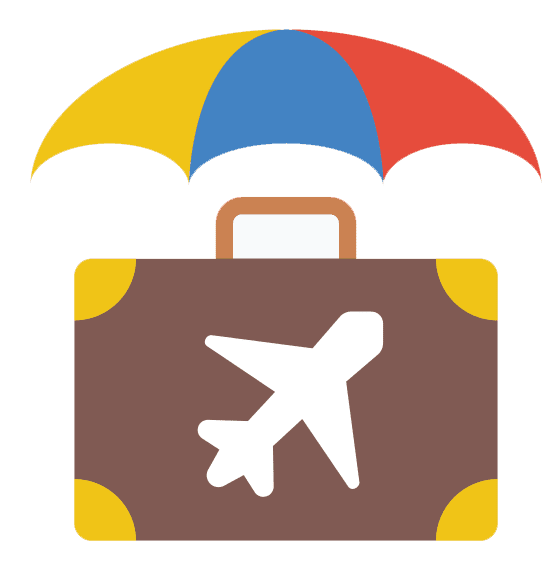
TRAVEL INSURANCE

PLANNING

DURATION
Safari with us
TRAVEL EXPERTS
Africa is our home…we live, breath & sleep Africa!
USA BASED TRANSACTIONS
Easy and secure safari payments
MANY HAPPY GUESTS
Please ask for references!



